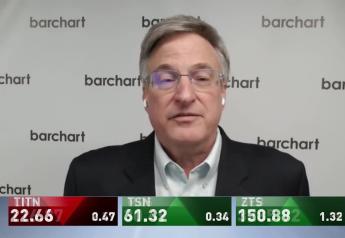Exclusive: How Did FBN Do The Impossible And Source Glyphosate for 2022? It Was Costly, But Paying Off Now
Glyphosate Force Majeure 021522
As farmers prepare for the 2022 planting season, a curveball is throwing yet another layer of uncertainty in some planting plans. Bayer sent a letter to retailers on Friday informing them a production issue with one of their suppliers will cause even tighter supplies of glyphosate this year. That's as one nontraditional retailer says they are in a comfortable position with glyphosate supplies, thanks to their business structure and foresight to lock in ingredients early.
The letter states Bayer is declaring force majeure, which is a move that suspends their contractual liabilities since the company says the issue with the supplier is out of their control.
In a statement to Farm Journal, Bayer says: "Recently a supplier of a raw ingredient needed to produce glyphosate suffered a mechanical failure which may have some short-term impacts on our production of the active ingredient to manufacture glyphosate. Our supplier is on track to restore production, we’ve sourced additional materials and made other mitigation efforts to help best manage this situation. We expect any impact to be marginal in terms of our annual glyphosate production.”
Glyphosate Supplies are Growing Tighter
Bayer didn’t quantify just how much of an impact it will have on overall production, but says it’s continuing to work diligently with customers to address their needs.
Even before the latest production snafu, supplies of glyphosate were tight, due to not just sourcing ingredients from China, but also Hurricane Ida causing Bayer's glyphosate plant to go offline. An ag retailer told Farm Journal they were seeing generic glyphosate supplies cut in half this year, with Bayer’s name brand products anywhere from 30% to 40% lower than expected. And that was before the force majeure was revealed on Friday.
Read More: Glyphosate Prices Soar As Much As 300%, And That's If You Can Even Get It
FBN Finds a Way to Produce Glyphosate
As ag retailers continue to navigate a turbulent supply scenario for the 2022 planting season, one company says their glyphosate supplies are in a “comfortable” position. And the reason may be because they were forced to vertically integrate, since the traditional supply chain wouldn’t allow the company in.
Farmers Business Network (FBN) is a nontraditional ag retailer, going around typical retail channels and selling direct to farmers through their own network. The company's director of North American crop protection products told Farm Journal they were forced to source active ingredients directly from China and produce their own glyphosate products.
“Our original go-to-market strategy was just to be a digitally enabled, logistically enhanced retailer,” says Marc-Andre Fortin. “We were going to have fulfillment-like models similar to e-commerce models in the consumer space. But unfortunately, we didn't have the support from the supplier. So, we had to come up with a second plan to do so.”
Fortin says the process to vertically integrate was time-consuming and costly. The only reason FBN was successful was due to support from investors, he adds.
“We have our own technical registrations, we have our end-use registrations, we buy the technical formulating in-country or import finished goods and then sell direct to farmers,” Fortin explains. “We took out a lot of the steps in the supply chain. Because of that, we get to offer good prices to customers and are a little bit more independent.”
Glyphosate Black Swans
While FBN didn’t know overall glyphosate supplies would be as tight as they are today, Fortin says the company had foresight to see supply chain issues would translate into production problems in 2022. FBN started sourcing the active ingredients from China and other international sources early on. But then once the Luling, La., plant went offline due to the hurricane, it reinforced the fact FBN was in a good position, thanks to aggressively sourcing the active ingredients early on.
“Fortunately, this year, because we aren't supported by the major manufacturers, we had to vertically integrate our supply chain, and integrate all the way back to the source countries that make the technical, and then import that technical and formulate in-country under our own brand. So that really helped us kind of get ahead of the curve and be a little bit less impacted by the Hurricane Ida situation at the Louisiana plant. That had a major impact on supply for the North American market. FBN is largely unaffected by that because of the fact we had purchased the tech, and we are formulating the product in-country.”
Ag Retailers Try to Siphon Supplies off FBN
As farmers report not only higher glyphosate prices, but situations where retailers can’t guarantee availability, some retailers tried to find glyphosate wherever they could get it, and that included going through FBN. As ag retailers tried to siphon supplies from FBN by ordering from their site, Fortin says FBN discovered what some ag retailers were doing and quickly implemented measures to shut down those efforts.
“Retailers do a really good job of hiding themselves when they try to purchase from us. They work hard to buy in a way that we don't catch them,” Fortin says. “We want our best deals to always go to farmers. But what we found is that when our price was drastically below the market, we would have these massive orders coming from some farmers, but they were really retailers posing as farmers, or trying to use a farm to purchase from us. We did have to implement some volume limits by customer and by transaction and developed other ways to ensure it was not a retailer posing as a farmer.”
FBN then implemented volume limits, which Fortin says helped. They saw the number of orders go up, and the size of the orders decline.
“Right now we feel pretty comfortable with our position, and that's due in part to how long we've been purchasing glyphosate technical for our production. Our procurement teams have been doing a really fantastic job early into last spring to start buying product and kind of stockpiling our position so we could have a robust position going into FY 22,” Fortin says. “We still feel today like we're in a comfortable position. The caveat with a comfortable position is that it's a comfortable position for FBN. But we are still such a small percent of the market that doesn't really impact the overall position of the market. FBN members can feel confident about being supported.”
Ag Input Shortages Beyond Glyphosate
Fortin says considering how high demand was for fungicides and insecticides last year, especially with the intense pest and disease pressure, inventory for some insecticides and fungicides this year is tight. He says FBN has also had issues sourcing glufosinate.
“In the international markets, Brazil is sucking up a lot of volume and it's tough to get any reasonably priced volume in North America,” he says.
Related Stories:







